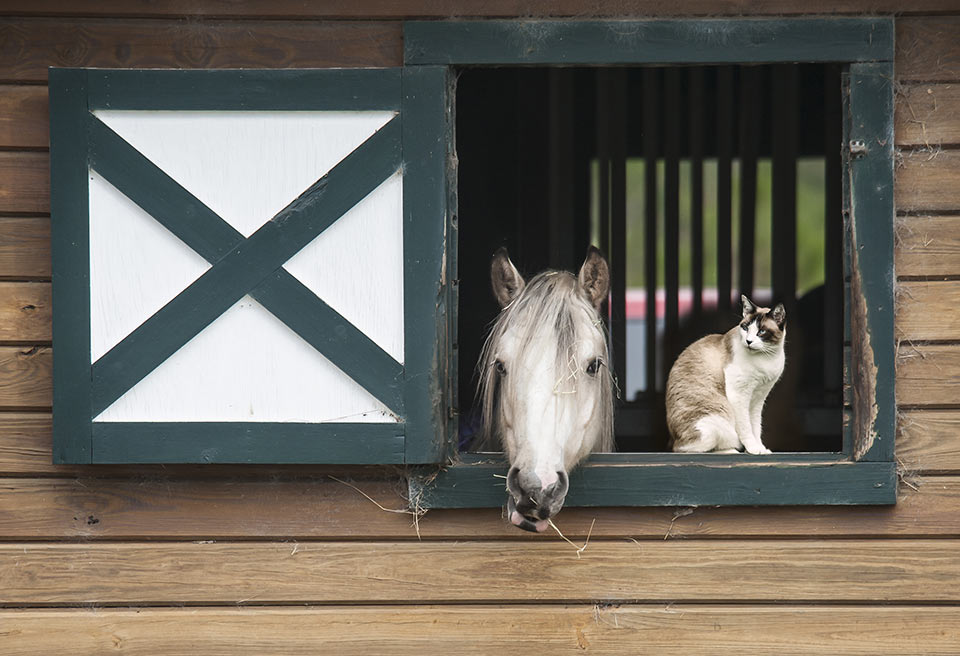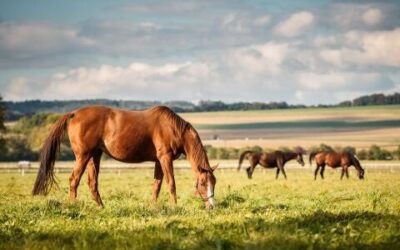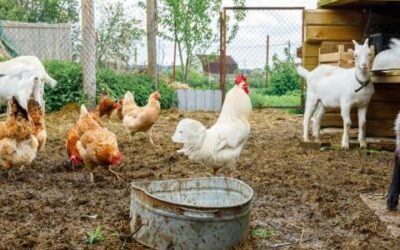For Some Horses, Seasonal Allergens and Respiratory Illness Make Out-of-Doors Intolerable
 Horse owners who live in the North know that winter is long and brings more time in the stable. But for horses that suffer from allergies to insects, midges, or pasture-associated pollens and molds, the summer season means avoiding the outside or being turned out only at night. For horses with heaves or COPD, summer pasture can aggravate their condition. While respiratory conditions caused by summer allergens have different triggers than non-summer related conditions, both have the same symptoms, and management of the condition follows similar guidelines.
Horse owners who live in the North know that winter is long and brings more time in the stable. But for horses that suffer from allergies to insects, midges, or pasture-associated pollens and molds, the summer season means avoiding the outside or being turned out only at night. For horses with heaves or COPD, summer pasture can aggravate their condition. While respiratory conditions caused by summer allergens have different triggers than non-summer related conditions, both have the same symptoms, and management of the condition follows similar guidelines.
Managing Equine Allergies This Summer
Soaking Hay. Soaking, wetting, or steaming hay prior to feeding helps expand mold spores so the particles are not as apt to be inhaled. According to equine nutrition consultant Dr. Clair Thunes in a Q&A about equine nutrition for Horse.com, soaking hay is an excellent alternative – at least when water is plentiful. “When you’re feeding soaked hay, make sure you are feeding it at ground level,” Thunes cautions. “The horse needs to be low so their respiratory tracts can drain.” (You can find the full Q&A at Horse.com. Dr. Thunes’ answer to the equine respiratory question occurs around 19-minute mark.)
Pellets or Cubes. Because they tend to be less dusty, feeding pellets and cubes can mitigate particle inhalation. While a pellet-only diet can go against our instincts to feed our horses in a way that most mimics grazing — taking time to chew, thus creating saliva that buffers the stomach — today’s automatic pellet feeders make it a viable option. Feeders can be programmed to deposit pellets at intervals, thereby simulating grazing and at the same time managing respiratory dangers.
Haylage. Haylage, a high-moisture hay compressed and encased in plastic within hours of harvesting, can be a lifesaver for horses with respiratory allergies. This moist, soft feed is very low in dust. It makes an attractive meal, it’s easy to chew for older horses, and it’s high in nutrients. The downsides can include cost and difficult transport, owing to the moisture content. And, owners must be vigilant about the integrity of haylage packaging: punctures can lead to contamination and the risk of botulism.
Supplements. According to Kentucky Equine Research, omega-3 fatty acids, given as a supplement, can benefit equine respiratory illness due to its anti-inflammatory properties. It can also have benefits for reproduction, bone development and numerous inflammatory conditions in horses. You can read the research at KER.
Good Barn Management. “Think about the bedding you’re keeping your horse on,” said Thunes. She cited current research out of Europe that suggests avoiding straw bedding for any performance horse — even those without respiratory conditions. “Straw tends to be higher in mold spores that aggravate the respiratory tract,” she said. “Consider choosing a stall flooring or using minimal bedding.” Some owners may opt for low-dust or moisture-absorbing bedding to eliminate smell and reduce respiratory issues associated with breathing ammonia. Thunes also cited leaf blowers used in stalls as a sure-fire way to maximize harmful dust and cautioned owners to be mindful when mucking out stalls by not tossing around bedding and stirring up airborne particles. Increasing stall ventilation is an important consideration as well, especially for horses who limit their outdoor time during what can be an uncomfortable allergy season.




